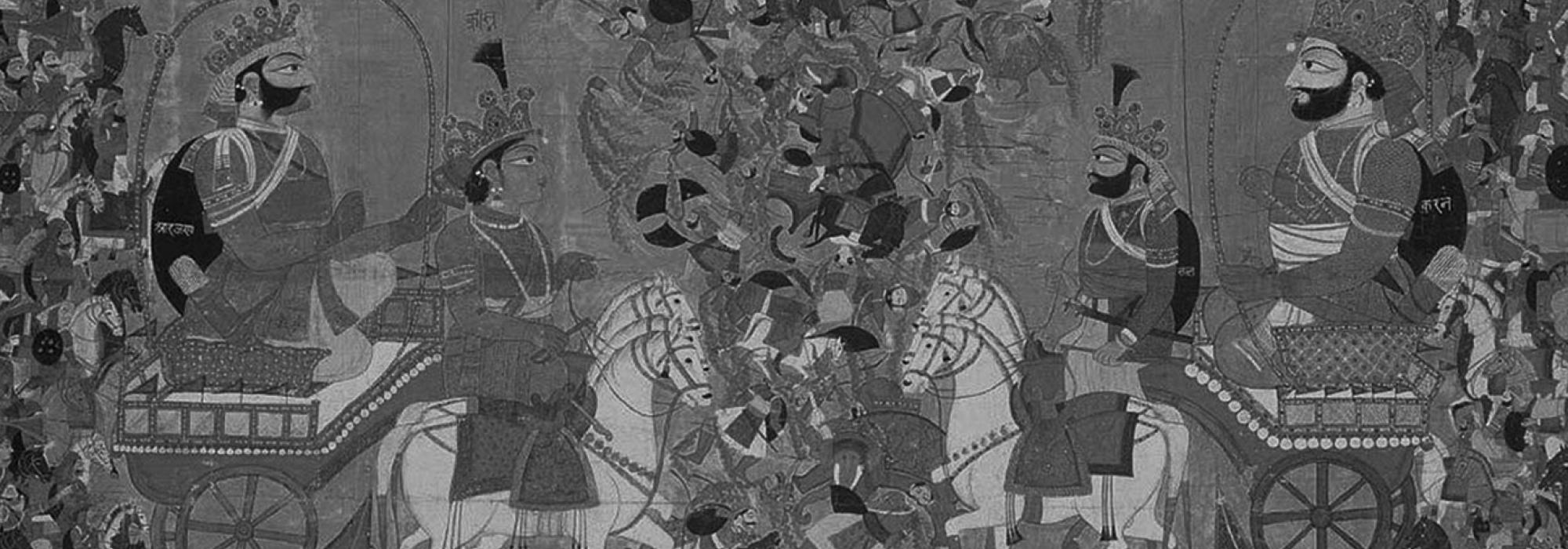For many of us, Krishna is the epitome of sanatana dharma. His every thought, word, and action embodies the spirit of Hinduism. It is no surprise that his wartime counsel to Arjuna is revered as the greatest summary of Hindu thought. We can never be sure if Krishna spoke the exact words of the Bhagavad-Gita as we know it today, but it seems likely that at least the core message of the text was spoken by Krishna. We have all been in situations where a despondent friend has asked us for advice. The most natural thing to do is to offer words of consolation that are drawn from our own life experiences and insights. That is precisely what Krishna seems to have done at the battlefield of Kurukshetra. And if there’s any doubt, it is immediately removed when we see the Gita in light of Krishna’s life.
To get an overall picture of Krishna’s life, we can refer to four primary sources – the Mahabharata, the Harivamsha, the Vishnu Purana, and the Bhagavata Purana. While these texts were composed at different points of time, there is little or no variation with regard to the events and stories in Krishna’s life. Whether Krishna was a historical character or not is beyond the scope of this work but it becomes evident that he was aligned in word and deed.
While the message of the Gita arose from Krishna’s own wisdom, in some sense, he doesn’t lay claim to the wisdom. Even when he says that he initially taught the wisdom to Vivasvat (BG 4.1), the emphasis is not on him but on the timelessness of the message. He values the living tradition, which has an unbroken lineage. There are times when the wisdom seems to be lost (BG 4.2) but it is always revived by a true seeker. Further, he acknowledges the Vedas on several occasions (BG 2.45, 7.8, 8.11, 9.17, 10.22, 13.4, 15.15, etc.)
At the same time, he also speaks about the limitations of adhering too much to the letter of the Vedas. He warns Arjuna about the dangers of becoming a ritualist (see for example, BG 2.42-46).
Among the various deities and their avataras, only Krishna has been called acharya (teacher). Not only is he the Gatacharya, he is also the jagadguru (teacher of the world). The word acharya is instructive. Anyone with basic education can learn up a subject and teach it. That makes him a teacher or a tutor, not an acharya. To become an acharya, one has to live the teaching: “Only a person who has learnt all the scriptures, has a proper understanding of it, and also practices it in his own life can be called an acharya.” (Apastamba Dharmasutra 1.2.6.13).
Theoretical knowledge is not sufficient for a person to become an acharya. He must acquire knowledge (prapti, sangraha), he must understand pedagogy (paddhati, vyavasthapana), and he must practice the message (jivananvaya, anushthana). This is the reason why an acharya’s words can be taken as truth. Their words truly have value.
Krishna is one such acharya and through the course of this article series, we will see how his life and his message seamlessly merge into one another. A caveat we must add here is that we’re assuming that the reader has a working knowledge of the Bhagavad-Gita and has a basic awareness about the life of Krishna.
To be continued...
References
Bhagavata Purana (Gorakhpur: Gita Press)
Critical Edition of the Mahabharata and the Harivamsha (in 5 volumes) edited by V S Sukhthanker et al. (Pune: Bhandarkar Oriental Research Institute, 1966)
The New Bhagavad-Gita by Koti Sreekrishna and Hari Ravikumar (Mason: W.I.S.E. Words, 2011)
















































